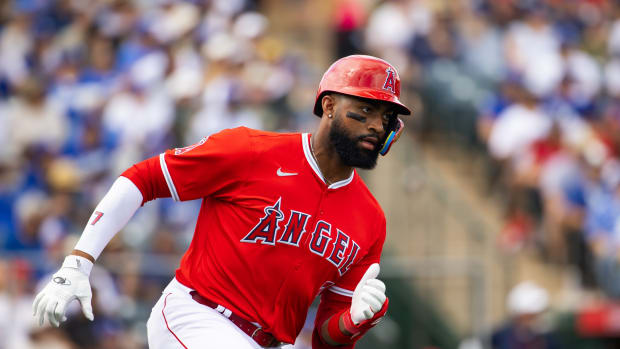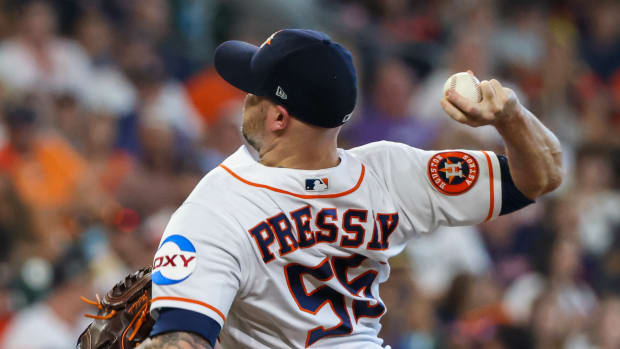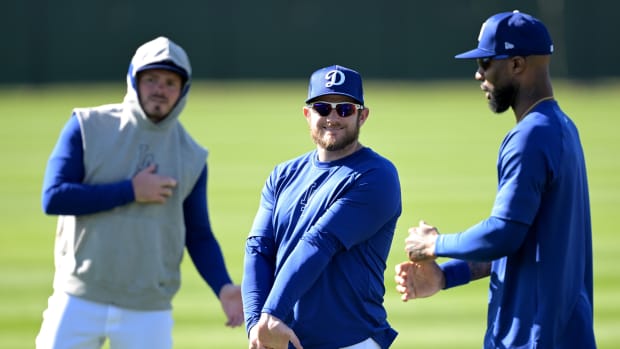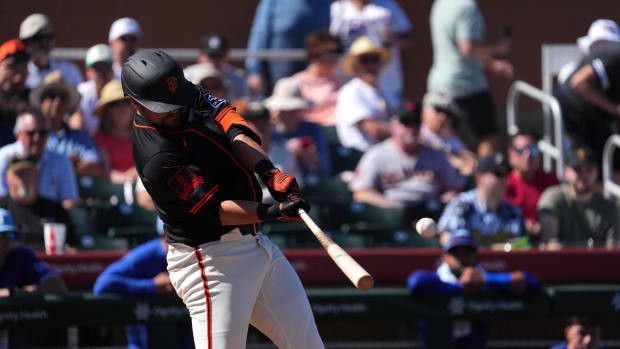Mike Trout Is Compiling a Historic Season and the Angels Are Wasting It Again
The box score of Tuesday’s Diamondbacks-Angels game includes something that’s become so familiar as to feel almost mundane—Mike Trout on base four times in four plate appearances. That’s just about what he did on Monday, too (2-for-3 with two walks), and exactly what he did on Sunday (2-for-2 with two walks), and on and on, to the point where he’s reached base in 29 of 37 plate appearances in his last eight games. The excellence of his performance is overshadowed only by its sheer absurdity. The man has made eight outs in the last nine days! He’s been reaching base, on average, almost four times per game! Through this stretch, he’s hit .696/.778/1.261—a 2.039 OPS, a mind-boggling figure no matter how brief the timeframe.
This June is on track to be the best month of Trout’s career, and this has been its best week yet. Each day has been only a very slight variation on the singular theme of how to be the most incredible player in baseball. While there was nothing different about Tuesday’s performance, however, there was something different about the game itself. The Angels actually won this one.
The team has had just two victories during Trout’s recent tear, with a 13–14 record over the last month. They’ve gone from just out of reach of first place to nearly 10 games back in the AL West. That deficit wasn’t born in a vacuum, of course; it owes plenty to the Houston Astros’ recent wild hot streak and the Seattle Mariners’ continued refusal to crumble. But that doesn’t make it any less frustrating—baseball’s best player is better than he’s ever been, quite possibly better than any of us have seen, and it still hasn’t been enough for his team just to break even.
That concept is hardly groundbreaking. The structure of baseball has always allowed for amazing players on terrible teams, with the game itself built on the idea that one guy’s presence can only possibly affect so much. Heck, Trout’s whole career has illustrated that point, with the last two years painting an especially detailed picture. The Angels have had back-to-back losing seasons, and throughout them, he was unquestionably the best hitter in baseball—nearly twice as good as league-average at the plate, posting a 179 OPS+ in a time when no one else topped 165. The current situation is nothing new, then, but the exact severity of it is. Because Trout has never been quite this good before, and because this team was supposed to finally be capable of backing him up.
For just about everyone else on this roster, the last six weeks have seen everything come crashing down. While this is a rotation that had struggled mightily with injuries in the past, they made it through the first few months of this season in relatively good health—only to see Garrett Richards, Nick Tropeano and, most crucially, Shohei Ohtani land on the disabled list in the last few weeks. Meanwhile, Andrelton Simmons and Zack Cozart each slumped this month before being sidelined by injury themselves. (Simmons returned this week.) Any one of these situations alone could have made the tiny difference needed to spell disaster in such a tough division; all at once, they just might prove fatal. There’s plenty of time left in the season, sure, but there may not be enough to make up for a month like this one.
And yet, again, this month has been the best of Trout’s career. He has a 270 OPS+. The number of runs that he’s scored is greater than the number of times that he’s struck out. This would be remarkable in any context, but try situating it in the framework of what he did last month. In May, Trout posted a 220 OPS+. He was then, as now, the best hitter in baseball—and look at how much better he’s been this month. The difference between May Trout and June Trout is the difference between a league-average player and a guy who’s only half as good as that. It’s the difference between Alcides Escobar at the plate this year and Edwin Encarnacion. Trout was already the best, and lately, somehow, he’s been far better even than that.
Trout’s 2018 WAR is 6.5 so far, according to Baseball-Reference. That number is eye-popping on its own terms; it’s not even midway through the season, and Trout’s already built such a sizeable lead over second-place Jacob deGrom that the difference between the two equals a full 35% of deGrom’s 4.8 WAR, to say nothing about the difference between him and literally everyone else. Another view? In 114 games played last year, Trout was worth 6.7 WAR. At 73 games so far this season, he’s already almost there. Trout was very, very good in 2017—excellent, even, a fourth-place MVP candidate! He’s been roughly double that player in 2018.
It seems preposterous for him to be able to continue on like this, but, then again, it’s preposterous that he’s done anything like this at all. So let’s just say that he does keep it up. Trout is on pace for a full season of 14.2 WAR—just above the all-time mark for a position player, Babe Ruth’s 14.1 WAR in 1923. He very well might break the record, but if he does, it looks increasingly likely that it’ll be for a team that won’t make the playoffs. And if that feels even more preposterous than the idea of him breaking the record in the first place, well, in a sense, it is. A player can only do so much to control his team’s fate, yes, but when that player alone is worth a double-digit number of wins?
Baseball history has produced 57 individual seasons by position players with 10.0 WAR or greater. Two of those seasons have come from Trout, in 2012 and 2016; neither of those teams made the playoffs, though the first one did finish with a winning record. The other 55? The average win total of those players’ teams is 90. A full 20 of those teams went to the World Series. (And all of these teams, save one, had just one player this good—the only club to carry two 10-WAR players at once was the 1927 Murderers’ Row Yankees, with Ruth and Lou Gehrig.) There are just four teams that have ever had a player anywhere near this good and still finished with a losing record. There’s the 1959 Chicago Cubs, who finished 74-80 despite Ernie Banks’ 10.2 WAR, and there’s the 1991 Baltimore Orioles, who went 67-95 as Cal Ripken posted the best season ever by a shortstop with 11.5 WAR. There’s the 1924 St. Louis Cardinals, with their 65-89 record, even as Rogers Hornsby posted the highest batting average in the modern era as part of his 12.1-WAR season.
Then there’s the 2016 Los Angeles Angels, with Mike Trout’s 10.5 WAR. And there’s a very real chance that there will also be the 2018 Los Angeles Angels, with Mike Trout again—in what could potentially be the best season of all time, even if it won’t be enough to save his team.



































